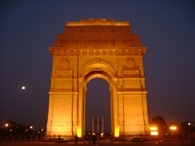 India has a habit of surprising its critics and sceptics - which may be why, a few years ago, Edward Luce titled his readable book In Spite of the Gods: the Strange Rise of Modern India.
India has a habit of surprising its critics and sceptics - which may be why, a few years ago, Edward Luce titled his readable book In Spite of the Gods: the Strange Rise of Modern India.
At the time of the fourth general election, in 1967, in a country racked by successive years of drought, the aftermath of a war, weak political leadership and all manner of internal dissensions, a leading British newspaper forecast that it would be India's last election.
Three decades earlier, Winston Churchill had forecast that if the British left the country, "India will fall back quite rapidly through the centuries into the barbarism and privations of the Middle Ages". It was, of course, during Churchill's rule that four million died in the Bengal famine.
The critics and sceptics are not just British, they are Indians too. Indira Gandhi felt the country would fall apart if she was not at the helm, and hijacked the Constitution to perpetuate her hold on power.
Then, the economist Raj Krishna declared in 1980 or thereabouts that India was condemned to a "Hindu" rate of growth - because, no matter what policy the government followed, GDP growth seemed to remain stuck at 3.5 per cent a year. This, at exactly the point in time when growth was accelerating to 5.5 per cent and 6 per cent.
Coming to the present, virtually no forecaster -Indian or foreign - said that the Indian economy would grow at the 8 per cent that the finance minister has now predicted for the current financial year; till a month ago, the most optimistic figure was 6.75 per cent and the consensus was closer to 6 per cent.
The lack of confidence in the country, or at least among its elite, showed up at the climate summit at Copenhagen last weekend. For, it might be argued, it was a fear of being bullied at the negotiating table that led to the grateful acceptance of the Chinese hug, thus losing the chance to make the point that India's emissions record is vastly superior to China's.
This tentativeness in the elite contrasts strangely with the greater optimism that Indians as a whole have about themselves.
The Washington-based Pew Research, whose work spans a couple of dozen countries, has recorded consistently in recent years that Indians outscore most others in their optimistic outlook about where their lives are headed -and are twice as confident as Pakistanis (the Pakistanis were more optimistic till as recently as 2002).
In some circles, this has already translated into premature triumphalism - as though India's continued rise is now inevitable, whereas much hard work remains to be done if the country is to become a successful economy and a modern society.
The more reassuring fact is that Indians now benchmark themselves internationally - whether it is global competitiveness or GDP growth, corruption or human development indicators.
If the preparation for the Commonwealth Games has been a disaster story, the comparison is with the Beijing Olympics. If GDP growth this year is going to be 8 per cent, China's is 9.6 per cent.
This global benchmarking has a dual benefit. It keeps premature triumphalism under control (imagine the strutting about if China were growing slower than India!); and it focuses efforts on addressing the drawbacks.
The Department of Industrial Policy and Promotion, for instance, is tackling point-wise the many issues on which the World Bank has scored India poorly on the ease of starting a business.
It is such mature responses, and not constant scepticism or premature cockiness, that will keep the country on track as it enters a new year and a new decade.









 © 2025
© 2025